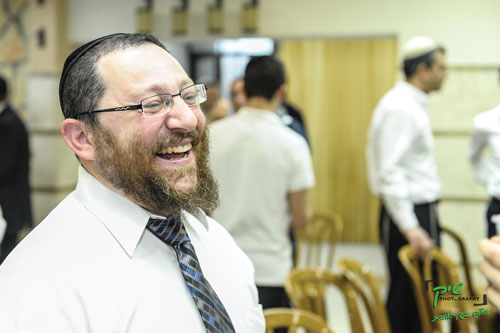.jpg)
.jpg)
On a recent Motzoei Shabbos, alumni spanning five decades of the Moty Hornstein Institute of Yeshivat Sha’alvim and of Sha’alvim For Women (and spouses), assembled at Sha’alvim for a reunion/Melava Malka. In addition to getting together and being with friends, family, fellow alumni and rebbeim, the evening featured a two-tiered panel discussion on the issue of “Engaging The World; To What Degree?”
Rav Ari Waxman (YS ’83), director of the MHI of Yeshivat Sha’alvim, opened the program with an adaptation from Hamlet. “To disengage or not to disengage, that is the question. Is it preferable to remove oneself from engagement in this physical, mundane and complicated world or perhaps does spiritual success result from descending to these dark zones, and to elevate the sparks of sanctity that are found in the physical realm?”
Rav Waxman illustrated the inner tension of the desire to unite the spiritual with the physical, while being aware of the dangers of losing sight of this elevated goal. Rav Yechezkel Yakobson, Rosh Yeshivat Sha’alvim, encouraged the goal of mastering Torah and of applying that knowledge while engaging in the world, including the sphere of business.
Rav Dr. Avi Rosenfeld (YS ’92), lecturer at Machon Lev (The Jerusalem College of Technology) and a research fellow at both Bar-Ilan University and the University of Southampton, chaired the first panel which included Sha’alvim alumni who have made aliyah and are engaged in a variety of professional pursuits in Israel: Dr. Yoel Finkelman (YS’89-’90), teacher at Midreshet Lindenbaum and the Interdisciplinary Graduate Program in Contemporary Jewry at Bar-Ilan University. Dr. Finkelman is also the author of Strictly Kosher Reading: Popular Literature and the Condition of Contemporary Orthodoxy; Mr. Adam Klein (YS ’85), a partner and Deputy Department Head of the International Corporate and Securities Department at Goldfarb Seligman, the largest law firm in Israel, and Mr. Hillel Scheinfeld (YS ’90-’91), co-founder and COO of Viewbix, a video application company.
Among topics discussed were education of youth and living in closed or open communities—all key issues in creating a Jewish home in the modern era. Dr. Finkelman maintained that it is not possible to divide between the worlds of the spirit and of the mundane. Parents he said, are able to provide insights for children that are not necessarily conveyed at school.
Mr. Scheinfeld’s believes the Jewish People is a light for the nations. This is accomplished by bringing to fruition our ideals our homes, in the workplace, and communities. He believes that those with smicha who also have doctorates should call themselves Rabbi Doctors, as was once the fashion.
Mr. Klein recalled how his son, who was in high school, quoted Rav Yitzchak Hutner (mentioned by Rav Yamer in a visit to that school) about how we are tasked to live a broad life, not a double life. He maintains that integration is a national priority; he has attended weddings of a thousand people, and only he and the officiating rav wore kippot. Unity, he said, is essential for the Jewish People.
Rav Reuven Spolter (YS ’90), Director of Student Recruitment and a Jewish Studies Lecturer at the Orot College of Education, and Overseas Rabbinic Coordinator for Tzohar chaired the second panel, which included Rav Dovid Miller, Benjamin & Charlotte Gottesfeld Chaim in Talmud & Director of the Caroline & Joseph Gruss Institute of Yeshiva University in Jerusalem, Rav Dr. Shlomo Riskin, chancellor of Ohr Torah Stone Institutions and Founding Chief Rabbi of Efrat, and Assistant Rosh Yeshiva of Sha’alvim, veteran educator, Rav Michael Yamer.
Rav Riskin stressed the necessity of having rebbeim who love both Torah and their students. He maintains that “secular studies” is a misnomer, as we are charged to recognize God’s operation of the world in the natural realm. Students should graduate 12th grade with a full matriculation. Rav Miller conveyed the need of instilling mutual respect for other viewpoints within the accepted boundaries, and mentioned how there are different tribes in the Jewish People (this includes the Levite tribe who focused upon the world of the spirit). When schools deride others, he called for a mandate for parental response to correct the situation. Rav Yamer believes in providing an atmosphere of joint study of Torah, of nurturing emotional and intellectual connections to Torah, and a broad life, not a double life.
Rav Riskin and Rav Miller talked about focusing on the individuality of every student; similar to snowflakes, no two are identical. The rabbanim differed on providing programs to young women who decide to be inducted into the IDF. Rav Riskin has established the Hadas program, while IDF veteran Rav Miller noted the imperative of young women benefiting from parental guidance at that stage in life, in the home, simultaneously pursuing education and performing chesed. Rav Yamer relayed Rav Yakobson’s views on yeshiva students serving in the IDF: 1. It is a privilege, not a burden. 2. “Equality” is neither a goal, nor attainable. 3. Serving in the army is a part of the general framework of Divine Service, thus quantitatively military service must allow for spiritual growth achieved by study in yeshiva.
Rav Miller shared the words of Rav Kook that even during prayer we do not lose sight of the world. In terms of reaching out to others, both Rav Yamer and Rav Riskin referred to the Chabad system of shlichim. The former said that when a person identifies with a mission he is empowered; the latter illustrated this point using the example of a kohen who sprinkles water on the defiled and remains pure.
Rabbi Reuven Ungar is Director of Alumni Affairs of Yeshivat Sha’alvim.
By Rabbi Reuven Ungar










